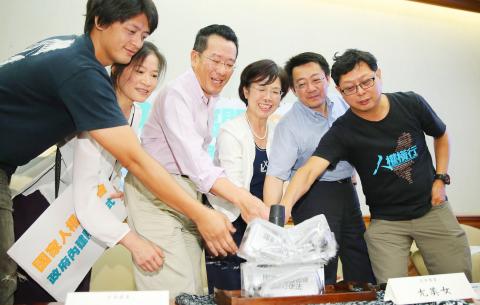Civic groups yesterday called for President Tsai Ing-wen (蔡英文) to fulfill her election promise of establishing a national human rights commission, saying the Control Yuan and Council of Grand Justices have been unwilling to examine domestic laws in light of international norms.
Members of Covenants Watch, the Taiwan Association for Human Rights and other groups joined Democratic Progressive Party (DPP) legislators Yu Mei-nu (尤美女) and Wellington Koo (顧立雄) at an event at which they used a hammer to smash open two blocks of ice containing pieces of paper representing legislation to create the commission, which they said has been “frozen” since being proposed by former president Chen Shui-bian (陳水扁) due to Chinese Nationalist Party (KMT) opposition.
“Every government will make mistakes, and there needs to be an internal mechanism to address them and prevent the impairment of human rights,” Convenants Watch convener Huang Song-lih (黃嵩立) said, adding that the commission could raise domestic awareness of human rights by comparing domestic laws and institutions with international laws, submitting recommendations for reform to relevant government agencies.

Photo: Liao Chen-huei, Taipei Times
“While it is unlikely that the commission could resolve all the problems of individual cases, it would prod the government into doing the right thing,” he said.
“If we want to internalize international human rights treaties, a human rights commission is clearly a necessary support mechanism for full implementation,” Taiwan Association of Human Rights executive board member Fort Liao (廖福特) said.
While the Legislative Yuan in 2009 ratified the International Covenant on Civil and Political Rights and the International Covenant on Economic, Social and Cultural Rights, activists have said implementation has failed, as government ministries have failed to fully harmonize domestic laws and regulations with treaty requirements.
Liao dismissed concerns that granting such a commission investigative powers would infringe on the constitutional privileges of the Control Yuan, which has already established a special committee for the protection of human rights.
“The commission’s investigations would largely focus on structural problems,” he said, adding that the Control Yuan’s investigations are limited to whether government officials have acted illegally or negligently in individual cases.
While Yu’s version of legislation would place the commission within the Presidential Office’s organizational structure, Koo’s version would establish it as an independent part of the Control Yuan to address constitutional concerns, mandating that 11 of the yuan’s 29 members be members of the commission and exempt their investigations and rulings from other members’ oversight.
Huang said that establishing the commission within the Control Yuan would place it in an organizational culture that could compromise its mission of reviewing domestic laws in light of international legal norms.
“As the Control Yuan’s responsibility is to examine whether officials have acted illegally or negligently, it only cares about whether any laws have been broken — which rules out any examination of whether a law might violate human rights,” he said, adding that the legal system is similarly ill-equipped to push for the adoption of international norms, because judges view themselves as defenders of domestic law.
“Ultimately, any human rights commission would face many of the same limitations as the Control Yuan and Council of Grand Justices, because they all depend on presidential appointments, but our hope is that having more people come forward [to investigate human rights] will have the potential to bring about some change,” he said.

The High Prosecutors’ Office yesterday withdrew an appeal against the acquittal of a former bank manager 22 years after his death, marking Taiwan’s first instance of prosecutors rendering posthumous justice to a wrongfully convicted defendant. Chu Ching-en (諸慶恩) — formerly a manager at the Taipei branch of BNP Paribas — was in 1999 accused by Weng Mao-chung (翁茂鍾), then-president of Chia Her Industrial Co, of forging a request for a fixed deposit of US$10 million by I-Hwa Industrial Co, a subsidiary of Chia Her, which was used as collateral. Chu was ruled not guilty in the first trial, but was found guilty

DEADLOCK: As the commission is unable to forum a quorum to review license renewal applications, the channel operators are not at fault and can air past their license date The National Communications Commission (NCC) yesterday said that the Public Television Service (PTS) and 36 other television and radio broadcasters could continue airing, despite the commission’s inability to meet a quorum to review their license renewal applications. The licenses of PTS and the other channels are set to expire between this month and June. The National Communications Commission Organization Act (國家通訊傳播委員會組織法) stipulates that the commission must meet the mandated quorum of four to hold a valid meeting. The seven-member commission currently has only three commissioners. “We have informed the channel operators of the progress we have made in reviewing their license renewal applications, and

Taiwan People’s Party (TPP) Chairman Huang Kuo-chang (黃國昌) yesterday appealed to the authorities to release former Taipei mayor Ko Wen-je (柯文哲) from pretrial detention amid conflicting reports about his health. The TPP at a news conference on Thursday said that Ko should be released to a hospital for treatment, adding that he has blood in his urine and had spells of pain and nausea followed by vomiting over the past three months. Hsieh Yen-yau (謝炎堯), a retired professor of internal medicine and Ko’s former teacher, said that Ko’s symptoms aligned with gallstones, kidney inflammation and potentially dangerous heart conditions. Ko, charged with

Taiwan-based publisher Li Yanhe (李延賀) has been sentenced to three years in prison, fined 50,000 yuan (US$6,890) in personal assets and deprived political rights for one year for “inciting secession” in China, China's Taiwan Affairs Office spokesman Chen Binhua (陳斌華) said today. The Shanghai First Intermediate People’s Court announced the verdict on Feb. 17, Chen said. The trial was conducted lawfully, and in an open and fair manner, he said, adding that the verdict has since come into legal effect. The defendant reportedly admitted guilt and would appeal within the statutory appeal period, he said, adding that the defendant and his family have